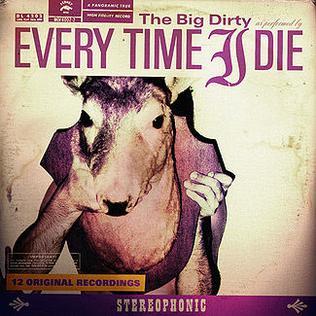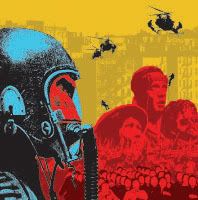
Every Time I Die is a metalcore band from upstate NY. Blending uncompromising metal with southern rock stylings and blistering tempos, they create some of the most enjoyable and exhilarating music within the genre.
'til death do we rock?
we're so full of shit.
'til death do we rock!
you keep buying it.
A common criticism directed towards metalcore is that of the unoriginality of the bands, and its current stagnation in the aftermath of Botch, Converge, and other pioneers of the sound. In the case of ETID, this complaint is certainly valid, but misses the point of the band in general. Their stuff may get a little same-y, but each release evolves upon the traditional ETID sound into something new, which is more than you can say for a lot of their contemporaries. For its part, The Big Dirty streamlines the approach from previous efforts, ending up with a more focused and tempered version of Gutter Phenomenon, while still keeping the southern metal feel of their former outing. Musically, you know what you’re going to get: hard, blazing guitar riffs stacked up upon one another delivered with the tempo of a speeding bullet. Essentially, it sounds just like its title would suggest. Music that would go well with a fight scene. Party metal for people who think AC/DC sound like pussies.
I've got a bone to pick with the morning sun and the first last call but I didn't put my hair in a pony tail for nothing, so if I'm going home alone I ain't going at all
But what really sets ETID apart is lyrically, where they are miles ahead of their colleagues. Each song is its own example of delightfully witty banter, delivered with a wry sense of self-awareness. But instead of just throwing out contrasting pieces of dialogue as stream of consciousness, with no forethought or intent, they create actual subject matters and narratives with which to snidely lambast. The band’s sense of ironic humour acts as a breath of fresh air for anyone tired of all the self-aggrandizing macho bullshit consuming metal.
we sing praises of the rebels who went by the book.
gravitate to teenagers artlessness' and sing it aloud.
the content is trivial. its pillow talk is plagiarized by the gadgets of lust.
just go to sleep, leave the gestures and customs to us.
For my part (and really, it’s useless to try and describe why I like this album so much without moving into the first person), this album represents a drastic change from the type of metal I was used to, injecting a much needed sense of humour into a brand of music which relies on any number of rather absurd and overdone tough-guy clichés. The sardonic sensibilities of this album feel practically slathered over each and every aural cavity, and the comments made hold a certain unsaid intelligence that threatens to belie the very nihilistic aesthetic of the album. It manages to remind me of In Utero in this sense, where the music gives a very raw feeling to it that it almost undercuts what exactly is being said by the artist. But it’s the fact that this appears the very intention of the artist that makes it interesting, as if they would prefer to see the message smothered by the surrounding musical onslaught, rather than have it front and center for the listener.
retract the accolade, the candid acclaim
inspiration is cutting its loss
regurgitate headlines or a theory on modern art
You've been fooled again, the red herring's a joke.
Regardless, this is fast, heavy, and surprisingly melodic metalcore that refuses to fall into the traps and pitfalls of the genre. While not innovative under any definition, it is a prime example of the lengths a band can go to while remaining within a rather stagnant style of music. Ultimately, The Big Dirty is a face-melting, surprisingly self-aware album that refuses to take itself seriously for more than a moment, and is far more intelligent than it bothers to let on.
it is better to destroy than to create what is meaningless,
so the picture will not be finished.
this is all very literal









